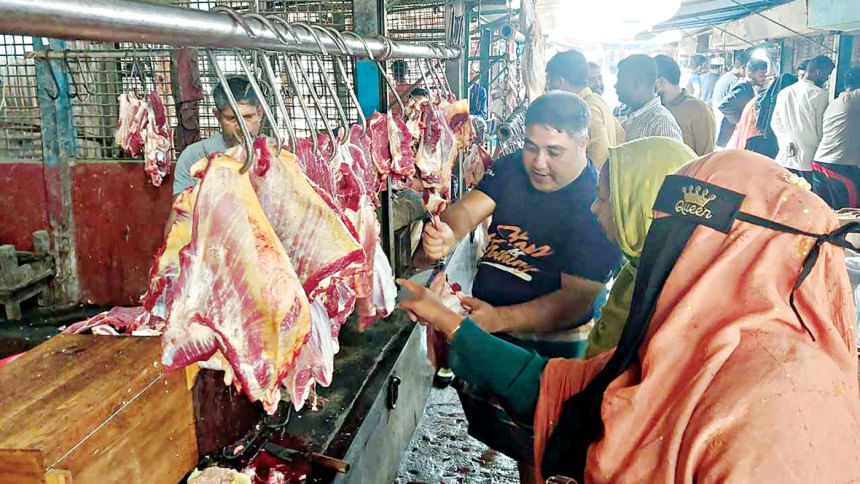Tangail municipality: Lack of animal screening threaten public health

Public health in Tangail is threatened due to a lack of screening of livestock and the absence of any dedicated slaughterhouse in the kitchen markets of the town.
Since the municipality and livestock department authorities have no effective mechanism of supervision, meat traders have been slaughtering animals unhygienically in the open, often on the roadsides in front of their shops.
There used to be a shed for slaughtering animals near Tangail stadium, which was abandoned following complaints by locals in 1988.
Tangail Municipality later built a smaller shed at the town's Park Bazar (market) for this purpose. However, when they started developing it further in 2012, the work had to be suspended over a land dispute between the municipality and the upazila Land Office.
Since then, animal slaughtering is being done by butchers at any place they consider convenient for them, ignoring concerns for public health.
According to rules, veterinary doctors from the Department of Livestock and inspectors from the municipality's sanitation department are supposed to inspect and issue health certification for all animals before those are slaughtered.
The livestock department in Tangail said they do not have necessary personnel for the job, while the Tangail municipality authorities claimed their inspectors screen animals at the town markets every day.
"I inspect the animals at the markets daily to ensure that meat traders do not slaughter sick animals. However, it is a visual inspection since we do not have the necessary tools for the purpose," said Sohel Hossain Raju, butcher shop inspector of Tangail municipality.
Several meat traders at Park Market, however, said they never saw any inspectors where they slaughter animals.
A team of local journalists during a recent visit to different kitchen markets in Tangail town observed animals being slaughtered in front of the butchers' shops at the markets and on adjacent roads.
"Without any dedicated slaughterhouse or proper inspection of animals, consumers have no way of knowing what kind of meat they are buying or whether it is safe for consumption," said Rubel Hossain, a resident of Adalat Para.
"Besides not maintaining hygiene while slaughtering animals, the meat traders often display and sell mutton and beef side by side," said Sanjoy Saha, a shopper at Park Bazar.
He urged authorities to ensure that cows and goats are slaughtered at separate places and beef and mutton are not kept together at shops.
"People can be infected with anthrax and many other diseases if hygiene is not maintained during slaughtering of animals or if it is done in the open," said Dr Minhaz Uddin, civil surgeon in Tangail.
Abdul Kader, a meat trader at Battala Bazar, said he slaughters the animals in Paradisepara area and transports the meat on a rickshaw van to his shop.
Shah Alam, a meat trader at Park Bazar, said most meat traders at the market slaughter animals in open spaces in front of their shops.
Contacted, Dr Mohammad Sohel Rana, additional district livestock officer in Tangail, said a veterinary surgeon has been assigned for health screening of animals to be slaughtered.
A proposal to build a dedicated slaughterhouse under a project was underway, but it got suspended as the municipality authorities could not provide any space or land for it, he added.
"Last year, municipality mayor along with deputy commissioner inspected different markets to find a suitable place for constructing a slaughterhouse. We demanded they construct a slaughterhouse at Park Bazar as soon as possible," said Shahjahan Miah Saju, president of the Park Bazar Meat Traders Association.
Contacted, Md Shihab Raihan, administrator of Tangail Municipality and also deputy director of the local government department in the district, said they are looking for a suitable place to construct a modern animal slaughterhouse.
"I hope the municipality residents will get it soon," he added.

 For all latest news, follow The Daily Star's Google News channel.
For all latest news, follow The Daily Star's Google News channel. 



Comments